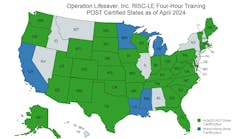The Department of Homeland Security told its federal, state, local and tribal partners Thursday that al Qaeda contemplated attacking the U.S. rail sector in February of 2010, although it has no information that transit systems currently face an imminent threat.
Spokesman Matthew Chandler said the department issued the intelligence notice in order "to make our partners aware of the alleged plotting; it is unclear if any further planning has been conducted since February of last year."
The department opted not to use its new National Terrorism Advisory System to issue the advisory. Chandler said the evidence for the plot is based on "initial reporting," which can often be "misleading or inaccurate."
Since the death of Osama bin Laden, DHS has told its federal, state and local partners to be on alert for possible revenge terrorist acts, but it has not used the NTAS. Homeland Security Secretary Janet Napolitano told senators Wednesday that the decision not to use the system -- which replaced the old, color-coded threat setup -- had to do with a lack of detailed intelligence regarding specific threats.
"Right now, we do not have any specific or credible intel that would lead us to issue an alert under this new system," she told the Senate Homeland Security and Governmental Affairs Committee.
The thought process hasn't gone over well with everyone. During the hearing, committee ranking Republican Susan Collins of Maine questioned the logic, and said that DHS should issue an NTAS alert, at least for the next two weeks, while analysts examine intelligence gathered from bin Laden's hideout in Abbottabad, Pakistan.
"I continue to question the secretary's decision not to increase the threat level," Collins said Thursday in response to the rail advisory.
Defense officials have said U.S. special forces seized hard drives, thumb drives and other potentially valuable intelligence from bin Laden's compound. Napolitano told the committee the intelligence community has already begun sharing homeland security-related information taken from that data with her department.
Since Sunday, DHS has taken steps to prepare for any possible attacks including reviewing protective measures for all potential terrorist targets, deploying additional officers to non-secured areas of airports and identifying any new targeting rules that could strengthen passenger and cargo screening.
Observers of the department say the case of bin Laden's death shows how DHS fits into the larger national security enterprise. While bin Laden was consider a top threat to the United States, the operation that killed him was driven by U.S. military and intelligence, with DHS looking at possible ripple effects that could result in harm to the country.
"When you have a high-profile event in this, it's a homeland security event with a little 'h' and a little 's,'" Chris Battle, a former DHS head of public affairs who now who manages homeland security issues for the Adfero Group, a public relations firm.
James Jay Carafano, director of foreign policy studies at the conservative Heritage Foundation, said Defense Department and the intelligence community serve as the "offensive" side of counterterrorism, able to strike at terrorist bases abroad, while DHS serves as the "defensive" side domestically. While the system still needs refinement, he said, in some ways "this is the culmination of what we've done since 9/11.
After 9/11, we said homeland defense is important, and we need a department for that, but really, homeland security should be integrated as part of national security."
Lawrence J. Korb, a senior fellow at the progressive Center for American Progress, said the Defense Department "clearly did its job" in the bin Laden case. Now, he said, DHS and its partners need to prepare for the possibility of al Qaeda and its affiliates looking to strike back.
"If bin Laden's associates decide they want to attack the United States, the Homeland Security Department has to stop them, not the 82nd Airborne," he said.
Rob Margetta can be reached at [email protected]
Source: CQ Homeland Security ©2011 Congressional Quarterly Inc. All Rights Reserved.
Copyright 2008 LexisNexis, a division of Reed Elsevier Inc. All rights reserved.
Terms and Conditions | Privacy Policy


